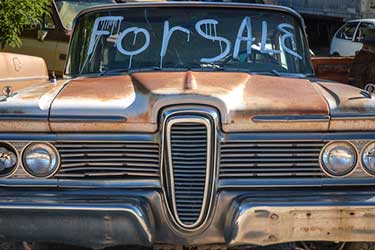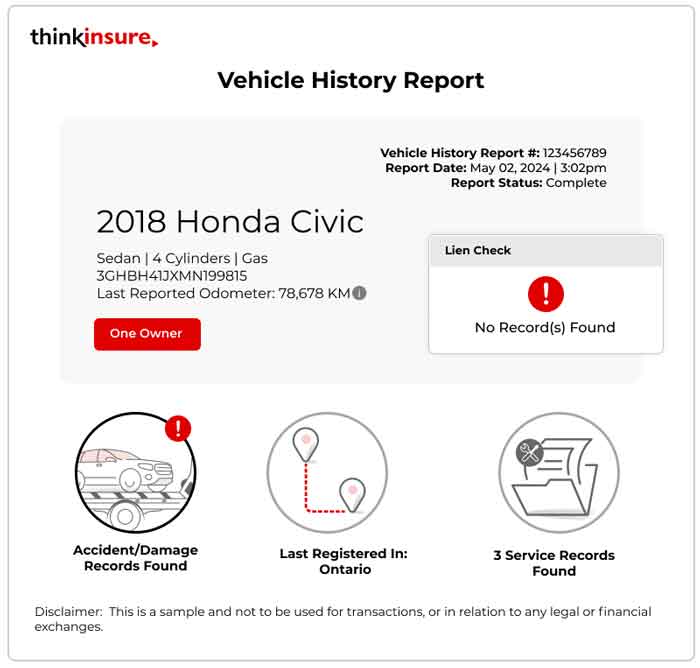
Written by Kayla Jane Barrie Updated on Nov 24, 2025 5 mins read

You’re in the market for a vehicle, and you’ve found the one. It’s the right colour and style in your price range, and you are ready to write the paperwork. Not so fast.
When you are buying a used car has a few more considerations than purchasing a new one. You could have a lemon on your hands if you are not careful. Before you sign on the dotted line, you must check the vehicle history report.
Here, we’ll explain the importance of these reports, how to get them, who offers them, and the type of information they provide.
A vehicle history report is a document you can obtain when purchasing a used car or transferring car ownership . It provides you with important information about a vehicle’s history. This includes information about ownership, accidents, repairs, and maintenance. You will need the vehicle's VIN to get a VIN check report. It is also often referred to as a used car vehicle history report.
Understanding a vehicle's history is paramount for several reasons:
A vehicle history report shows an overview of a vehicle’s history. It can tell you if a vehicle has been in an accident or had recalls and provides other information about damages. It is an invaluable resource that can help you decide whether or not the ride is worth purchasing or when you are finding car insurance quotes.
Buying a vehicle history report means you will get a thorough overview of the vehicle's history. The report will include the following information:
There are many ways you can go about getting a vehicle history report:
If a car dealer or private seller is reluctant to provide you with the report or the VIN to check it yourself, this is a red flag. There may be something wrong with the car they don’t want you to know about.
CARFAX is the premier company to buy a vehicle history report. You can purchase a CARFAX Canada verified report for $54.95 plus tax. You can also purchase a CARFAX Canada claims report for $39.95 plus tax. But, this report does not include a lien search.
It is often worth paying for the report, compared to potential repair bills and additional car maintenance for a damaged car.
Yes, its possible to get a completely free vehicle history report. Often, the seller of a vehicle will provide them along with the used vehicle information package.
As an alternative, there are a number of websites that offer free versions of history reports. However, these free reports are limited in the information they provide. You’ll get a snapshot of the car’s history, but not the entire story.
Here are the websites where you can get a free vehicle history report online in Canada:
You may also want to check out the Canadian Government recall database. You can enter any make, model, and year of a specific vehicle. The report will show you any recalls that should be done.

It is important to carefully review all sections of your vehicle history report as they may contain crucial information and warning signs. Here are some key areas to check when you get your report.
Yes. It is common for buyers to ask private sellers for the vehicle history report. You can also get a free report online using the VIN. Tread carefully if a seller is hesitant to provide you with a report.
No. You cannot use a licence plate to check the vehicle history because licence plates can be moved from vehicle to vehicle. You will need the VIN to get the report.
CARFAX is the leader when it comes to vehicle history reports. It provides the most thorough reports and has a strong reputation within the auto industry.
Yes. Vehicle history reports are legitimate documents that play an important role in the sale of a vehicle. It benefits sellers and buyers. As a seller, it shows your car is legitimate and can help you sell it quickly. As a buyer, it can let you know if there are any issues before you decide to purchase it.
| Categories | Auto |
|---|---|
| Tags | Driving TipsBuy and Sell Vehicles |
Read our insurance blog to get helpful tips, information and news.
Fatal collisions in Canada rose 9.14% from 2019 to 2023. Discover the latest road safety statistics, provincial rankings, and how these trends affect your auto insurance rates.
Find out if a seatbelt ticket will raise your car insurance rates and how insurers view seatbelt violations.
Ontario’s Project CHICKADEE dismantled a $25 million auto theft ring. Discover how this massive bust targets export enablers and what it means for rising Canadian insurance premiums.
Think refusing a breath test helps your case? In Ontario, it results in a minimum fine of $2,000 and a criminal record. Compare the penalties and protect your future.